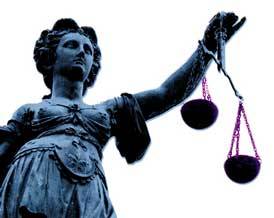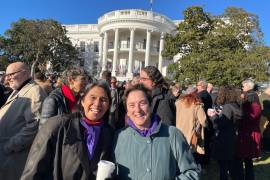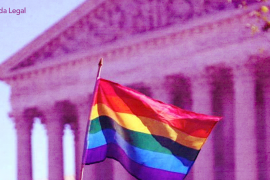
The Freedom to Marry: Why the Courts?
Blog Search
When faced with important civil rights cases, courts often come under fire from individuals and special interest groups seeking to undermine the integrity of our system of justice or the legitimacy of a particular decision.
The Supreme Court’s consideration of U.S. v. Windsor and Hollingsworth v. Perry, the federal challenges to the so-called Defense of Marriage Act (DOMA) and California’s Prop 8, provide an opportunity to talk about the role that our nation’s courts play in safeguarding constitutional rights and providing all people with equal access to justice.
This guide can be used by advocates to defend our democracy from attacks on our courts.
Attack on our courts: “Judges who uphold LGBT rights are ‘judicial activists.’”
In our democracy: Our constitutional system requires judicial independence.
- Americans want strong courts that protect individual rights and equal justice.
- When a law infringes on individual rights or equal treatment, judges have a duty to strike it down. This does not make them activist. They are upholding our Constitution.
- As guardians of constitutional rights, including minority rights, courts serve a counter-majoritarian function. This means that judges may be required to strike down laws that enjoy majority support in certain jurisdictions, when those laws unfairly target a minority for unequal treatment.
- It is not the role of a judge to enforce the will of the legislature or defend a law on the grounds that it was “popularly enacted.” It is a judge’s job to decide difficult legal questions in accordance with the Constitution and legal precedent, regardless of politics.
- “Judicial activism” is a political term that is often used to attack a judge when the speaker simply disagrees with a decision, particularly with regard to civil rights.
- There will always be people that disagree with the outcome of a particular decision—even when that decision lives up to our constitutional principles of liberty and equality.
Attack on our courts: “The rights of LGBT people should be left to the voters and the democratic process.”
In our democracy: Courts protect the rights of all Americans, not just the powerful and popular.
- It is the role of the courts to uphold individual rights and provide equal access to justice under the law.
- Voters and legislators don’t get to decide whether they will “allow” individuals to exercise their constitutionally protected rights. We don’t put the freedom of speech or the freedom of religion up for a public vote.
- Courts are an essential part of our democracy and provide a vital balance in our government, particularly when it comes to protecting individual rights.
- The Framers were very concerned that the democratic process could be used to make government work for the majority and the politically powerful, at the expense of minority rights.
- Our country’s founders designed the courts to serve as a constitutional check on the elected branches in order to safeguard the rights of politically vulnerable minorities.
- In drafting the Constitution, the Framers gave judges life tenure and forbade Congress from reducing judicial salaries so that the courts could remain accountable to the Constitution without fear of political pressure or retaliation. This independence from the electoral process helps to ensure that courts provide fair and impartial justice for all.
Attack on our courts: “Marriage is a state issue and federal courts shouldn’t get involved.”
In our democracy: States do regulate marriage, but may not violate the Constitution in doing so.
- The Constitution clearly provides that “No state shall … deny to any person … the equal protection of the laws.” This applies to state marriage laws and the rights of LGBT people.
- The states regulate marriage, but they cannot do so in a way that unconstitutionally discriminates or prevents people from exercising their rights.
- The federal government must also abide by the Constitution, yet the so-called Defense of Marriage Act requires the federal government to discriminate against thousands of legally married same-sex couples.
Attack on our courts: “Courts should not overturn state constitutional amendments adopted by voters or duly passed federal laws.”
In our democracy: Courts have a fundamental responsibility to uphold the Constitution.
- State constitutions may serve as guardians of individual rights by building in additional protections above those guaranteed by the U.S. Constitution. However, the Constitution establishes a foundation for the protection of human liberty, and the states may not fall below that federal floor.
- If the courts determine that a particular law or amendment unconstitutionally discriminates or deprives people of their constitutional rights, it is their duty to strike down that law.
- The fact that a law or amendment was popularly enacted does not mean that such a law or amendment is consistent with the duties imposed by the Constitution.
- Throughout our nation’s history, the courts have preserved the rights of all citizens and the guarantee of equal protection of the laws.
- Cases like: Brown v. Board of Education, which set the precedent needed to abolish the legal framework of racial segregation; Loving v. Virginia, recognizing the fundamental right to marry the person of one’s choice; and Lawrence v. Texas, affirming the fundamental liberty right to private sexual intimacy, all overturned state laws that infringed on constitutional guaranties.
Lambda Legal’s Fair Courts Project educates the LGBT community and our allies about the important role that state and federal courts play in safeguarding civil rights, promotes diversity on the bench, and defends judges against harmful attacks.




